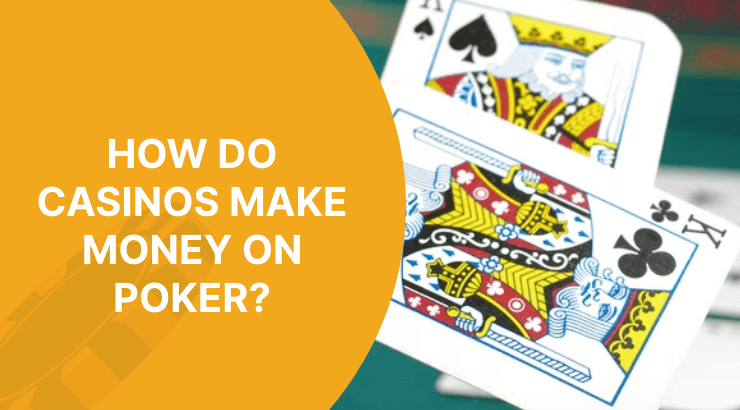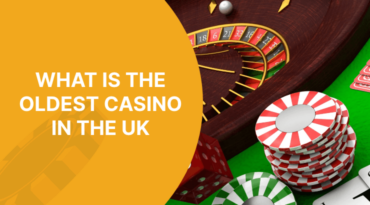SHARE
How Do Casinos Make Money on Poker: The Secrets of Casino Profits

People frequently wonder how casinos make money if they can afford to give away free drinks and rooms, let alone all other benefits and bonuses they provide. With some games, this is more obvious than with others: For example, it’s easy to understand how the house makes money on slots, but many players wonder, “How do casinos make money on poker?”
This guide will show you how casinos profit from poker in various creative ways, as well as some of the strategies they employ to keep players coming back for more.
How Does Casino Poker Work?
Even though playing poker online is very convenient these days, some people prefer the live poker experience; both options have their own rules and benefits. There are basically two types of poker games: In the first, the house has a distinct advantage over the player, and in the second, games do not have a built-in house edge.
Three Card Poker, Mississippi Stud, and Let It Ride are just some poker variants that have an advantage for the house. In other words, when you play poker in this category, you’re playing against the house, and its chance of winning is higher than yours.
On the other hand, Texas Hold ’em poker – possibly the most popular poker variant – and Omaha are examples of poker games in which the house edge is not built in, and you’re playing against other poker players. These games generate rake or fees to remain profitable, which we’ll go over in greater detail shortly.
How Does a Casino Make Money on Poker?
Casinos are in the business of making money, so they spend a lot on things like venues, equipment, and personnel, to provide an enjoyable experience for their customers. However, the casino doesn’t profit from you if you’re not trying to beat them. So, what makes casino poker rooms worth opening?
The short answer is – the rake. But, what is the rake? It’s the fee casinos charge from the winnings in each round. In reality, the rake is more complex than simply charging a small fee, however. Each casino has a different type of poker rake, depending on the game you’re playing, your location, and the casino’s pricing, which we’ll go over now.
Pot Rake
A pot rake in poker is a small percentage of the pot retained by the casino. Casinos take a share of each hand played to ensure profit, and the rake usually ranges between 2.5% and 10%, depending on the casino.
The higher the stakes of the game, the greater the rake. While the rake percentage may appear small, it adds up quickly and is a significant source of revenue for casinos – they wouldn’t host the games otherwise.
For example, in a raked poker game, if 100 people play poker for an hour, with a buy-in of $100, and each pot has a rake of 5%, the casino will make £500 in that time. Furthermore, casinos frequently charge a higher rake to important players (such as high rollers), increasing their profits even more.
No-limit and high-stakes games typically have a maximum amount that can be collected to compensate for losses. In some cases, the rake is a fixed amount applied to all poker hands regardless of pot size.
The Gambling Commission regulates all legal gambling businesses in the United Kingdom, and businesses without the UKGC’s permits and licenses cannot collect a rake in their cardrooms. While many jurisdictions allow players to play cash games in their own homes, for the host, taking a rake in poker is illegal, as is making money in any way from these games.
House Edge
The house edge is the casino’s advantage over the players. This advantage is created by the casino taking a percentage of each pot as its fee, meaning the odds of winning are slightly skewed in its favour; even if you win a game, the house earns its percentage.
The house edge varies in size depending on the game and type of bet, but it is always present in some form. For example, the house edge in blackjack can be as low as 0.5%, while it can be as high as 5% in roulette. Although the poker house edge may appear to be minor, it can have a significant impact on your winnings over time.
The skill level of the players can also influence the house edge. Skilled players can actually gain an advantage over the house in games where skill is a significant factor, such as blackjack or video poker. However, luck is the most important factor in most poker games, and the house gets between 2% and 5% over time.
Tournament Fees
In addition to the house edge, casinos profit from poker tournament fees. When you enter a tournament, the casino requires a poker entry fee for your participation in the game, as well as an additional charge. These fees are typically a percentage of the prize pool, ranging between 10% and 20%, depending on the stakes. Most low-stakes poker tournaments charge an entry fee of 10% or less. On the other hand, poker tournaments with higher entry fees often have an additional fee of less than 10%.
For instance, a ticket for a single-table poker tournament might be £20 plus a £2 fee. The casino would then profit from this house rake, also known as “Vig” or “Vigorish.” Some poker rooms show these fees separately, while others include both charges in one price.
Comps
Casinos also make money from players by offering them “comps.” Comps are free services or products the casino provides its most loyal customers. These range from free rooms and meals, to show tickets.
To receive comps, players must show that they are wagering a certain amount. For instance, a player may be required to wager £100 to receive a £20 voucher for the casino’s restaurant.
Comps encourage players to stay longer and bet more. If a player is given free meals and lodging to play poker in casinos, they are more likely to stay there rather than go elsewhere, which means the casino will profit more from them in the long run.
Seat Charge
Instead of raking, some poker rooms in casinos charge a fee for each player. If you play high-limit cash game poker, you are more likely to see a seat charge than a rake. Every hour you play in one of these poker rooms, you will be charged a flat rate for your time. You could, for example, pay £20 an hour to play.
Online Poker Casinos
In the same way brick-and-mortar casinos make money, online casino poker rooms do, too. For each game they run, they take a small cut of the prize money, but they can afford to charge less and attract more players, because running a table costs less. The online poker rake works the same way as the pot rake in a physical casino, but additional benefits, such as rakeback, can usually only be found in online casinos.
What Is Rakeback?
Rakeback is a massive perk of playing online poker: Many good casino sites in the United Kingdom offer at least some kind of compensation for their players; in others, rakeback is not even taken into consideration.
Rakeback is a type of loyalty programme where poker players can earn back a portion of the fees (or rake) they paid to the house. For example, if a player pays £100 in rake over the course of a month, and the rakeback rate is 30%, then the player would receive £30 back from the casino.
Rakeback deals are usually only available at online poker rooms, as tracking how much each player paid in rakes at a live casino would be complicated. Rakeback varies significantly in size, but it is undoubtedly one factor that keeps players returning to online gambling venues.
Bottom Line
All in all, poker rooms survive on rakes and vigorish. Taking a rake in poker is necessary for the casinos and poker sites to generate revenue. Even so, it doesn’t mean you have to be taken advantage of.
Of course, gambling is a system that will always be highly profitable for casinos, which helps to explain why poker rooms are a staple in most UK establishments. Ultimately, it all comes down to the casino’s policy on the subject, which is why you should choose your casino carefully.
FAQ
Can the house ever lose in poker?
Even though the house has a significant advantage in poker, there are times when players can come out on top. This is most common in short-term situations where luck plays a role, as the house edge is inevitable in the long run.
Why do casinos take a rake?
The casino generates significant revenue over time by taking a small percentage of the pot on each hand. This money helps offset the costs of running the poker room and ensures that the casino always comes out ahead.
How does the house make money on poker?
The answer to “How do casinos make money on poker?” is complex: The first method involves charging a rake on every pot. Second, there are Tournament entry fees. Lastly, casinos profit by providing players with comps, encouraging them to stay longer and ensuring the house gets its cut in the long run.




